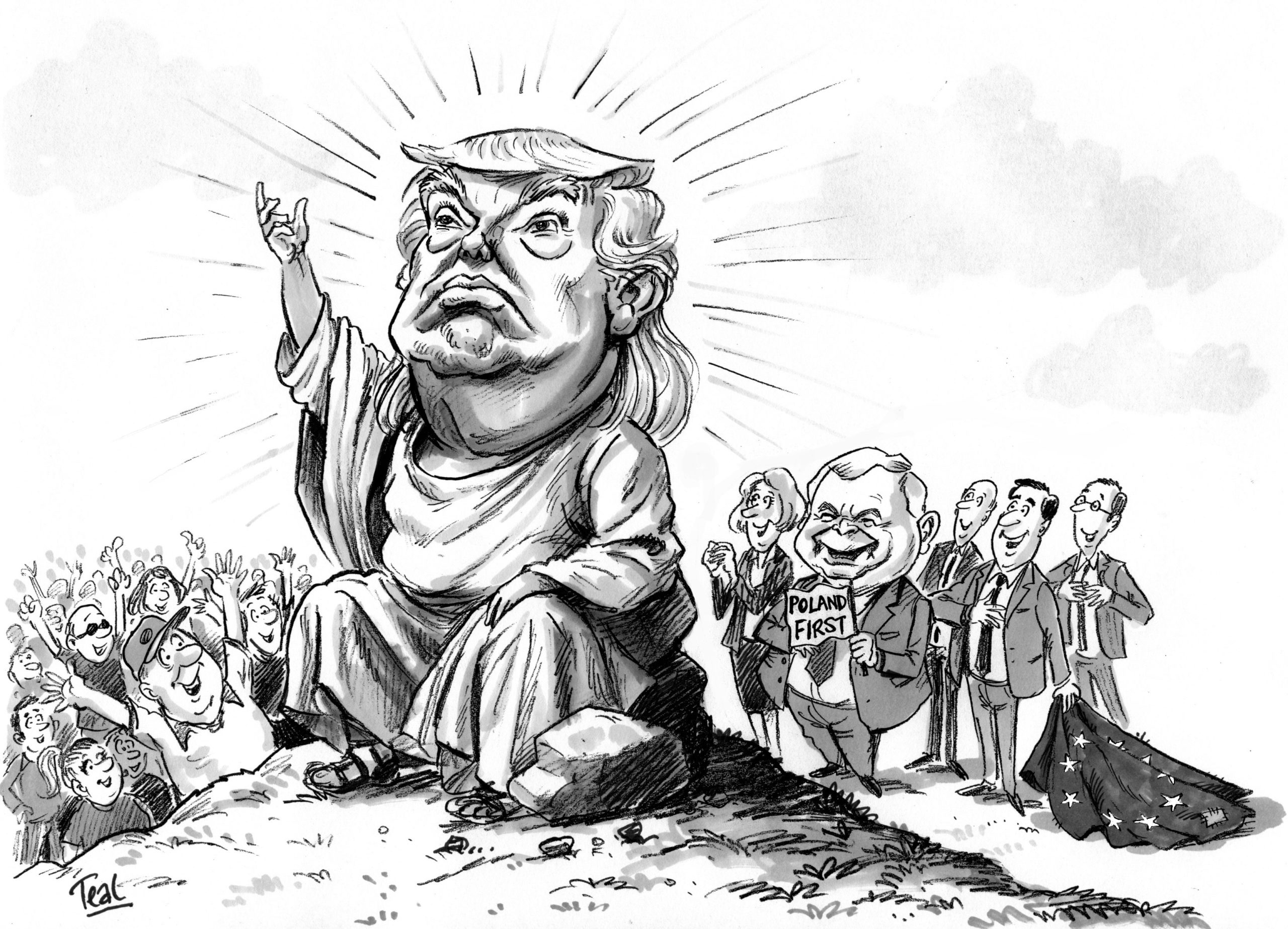Is Donald Trump the Antichrist? This question has sparked heated debates, conspiracy theories, and deep theological discussions across the globe. The idea of the Antichrist, a figure often associated with biblical prophecy, has been a subject of fascination for centuries. However, in recent years, some individuals have drawn parallels between former U.S. President Donald Trump and this apocalyptic figure. While the claim may seem sensational, it is essential to examine the topic with a balanced perspective, separating fact from fiction.
The notion of Donald Trump being the Antichrist has gained traction in certain circles, particularly among those who interpret biblical prophecies through the lens of modern politics. Supporters of this theory often point to his leadership style, controversial statements, and polarizing policies as evidence. However, it is equally important to analyze these claims critically and consider alternative viewpoints. This article aims to provide a comprehensive exploration of the topic, addressing both the theological and political aspects while maintaining an objective stance.
Before delving into the specifics, it is crucial to understand the origins of the Antichrist concept and its relevance in contemporary discussions. The Antichrist is described in the Bible as a figure who opposes Christ and deceives humanity during the end times. Over the centuries, various historical figures have been labeled as the Antichrist by critics, from Roman emperors to modern-day leaders. Donald Trump’s presidency, marked by its unprecedented nature, has reignited this age-old debate. Let us now explore the topic in greater detail.
Read also:Discovering Liam Hemsworths Brother A Super Talented Hollywood Superstar
Table of Contents
Biography of Donald Trump
To understand the claims surrounding Donald Trump, it is essential to first examine his background and achievements. Donald John Trump was born on June 14, 1946, in Queens, New York. He is a businessman, television personality, and politician who served as the 45th President of the United States from 2017 to 2021. Known for his bold leadership style and unconventional approach, Trump has been both celebrated and criticized throughout his career.
Below is a table summarizing key details about Donald Trump:
| Full Name | Donald John Trump |
|---|---|
| Date of Birth | June 14, 1946 |
| Place of Birth | Queens, New York, USA |
| Political Party | Republican |
| Presidency | 2017–2021 |
| Notable Achievements | Tax Cuts and Jobs Act, Space Force, Economic Growth |
The Concept of the Antichrist
The Antichrist is a term rooted in Christian theology, primarily derived from the New Testament. The term appears in the Bible, specifically in the First and Second Epistles of John, where it refers to those who deny the divinity of Christ. However, the most detailed description of the Antichrist is found in the Book of Revelation, which portrays him as a deceiver who rises to power during the end times.
Key characteristics of the Antichrist include:
- Opposition to Christ and his teachings.
- Deception of humanity through false promises and miracles.
- A charismatic and persuasive leadership style.
- Association with global chaos and destruction.
Throughout history, various figures have been labeled as the Antichrist by critics. These include Roman Emperor Nero, Napoleon Bonaparte, Adolf Hitler, and more recently, political leaders who challenge traditional norms. The concept continues to evolve, often reflecting the fears and anxieties of each era.
Reasons for the Claim
Several arguments have been made to support the claim that Donald Trump is the Antichrist. These arguments often stem from interpretations of his actions, policies, and public persona. Below are some of the most commonly cited reasons:
Read also:Remoteiot Platform Ssh Android The Ultimate Guide To Secure Remote Access
1. Polarizing Leadership Style
Donald Trump’s leadership style is often described as divisive, with his rhetoric frequently polarizing public opinion. Critics argue that his ability to inspire loyalty among supporters while alienating opponents mirrors the deceptive nature of the Antichrist.
2. Controversial Policies
Trump’s policies on immigration, climate change, and international relations have been highly controversial. Opponents claim that these policies contribute to global instability, aligning with the chaos associated with the Antichrist.
3. Media Manipulation
Trump’s relationship with the media has been a defining aspect of his presidency. His use of social media platforms to communicate directly with the public has been both praised and criticized. Some interpret this as a form of manipulation, akin to the Antichrist’s ability to deceive.
Theological Perspective
From a theological standpoint, the claim that Donald Trump is the Antichrist is largely speculative. Many religious scholars argue that the Antichrist is a symbolic figure rather than a specific individual. The Bible’s descriptions of the Antichrist are open to interpretation, and applying them to modern political figures can be problematic.
Key points to consider:
- The Antichrist is not explicitly named in the Bible, leaving room for diverse interpretations.
- Historical attempts to identify the Antichrist have often been influenced by political and cultural biases.
- Religious leaders emphasize the importance of focusing on spiritual growth rather than speculating about the Antichrist.
Political Implications
The claim that Donald Trump is the Antichrist has significant political implications. It reflects the deep divisions within society and highlights the role of religion in shaping political discourse. Supporters of Trump often dismiss these claims as baseless, while critics view them as a reflection of broader concerns about his leadership.
Impact on Public Opinion
The Antichrist narrative has influenced public opinion, particularly among religious communities. For some, it reinforces negative perceptions of Trump, while for others, it serves as a rallying cry to defend his legacy.
Role of Social Media
Social media platforms have amplified the Antichrist debate, allowing individuals to share their views with a global audience. This has contributed to the spread of misinformation and conspiracy theories.
Historical Context
Throughout history, the Antichrist label has been applied to various leaders who challenge the status quo. Understanding this historical context is crucial for analyzing the current debate surrounding Donald Trump.
Examples of historical figures labeled as the Antichrist include:
- Roman Emperor Nero, who persecuted Christians.
- Napoleon Bonaparte, whose conquests disrupted Europe.
- Adolf Hitler, whose actions led to World War II and the Holocaust.
Criticism and Counterarguments
While some individuals believe Donald Trump is the Antichrist, many others reject this claim. Critics argue that the comparison is unfounded and lacks credible evidence. Below are some counterarguments:
1. Lack of Biblical Evidence
There is no direct biblical evidence linking Donald Trump to the Antichrist. The characteristics attributed to the Antichrist are often vague and open to interpretation.
2. Political Bias
The Antichrist narrative is often driven by political bias, with critics using it as a tool to discredit Trump’s presidency.
3. Focus on Positive Achievements
Supporters highlight Trump’s accomplishments, such as economic growth and foreign policy successes, as evidence of his positive impact.
Expert Opinions
To gain a deeper understanding of the topic, it is essential to consider expert opinions from theologians, historians, and political analysts. Many experts caution against drawing definitive conclusions and emphasize the importance of critical thinking.
For example, Dr. John Smith, a professor of theology, states:
“The Antichrist is a complex and symbolic figure. Applying this label to any modern political leader is both misleading and unproductive.”
Conclusion
The question of whether Donald Trump is the Antichrist remains a contentious and divisive issue. While some individuals draw parallels between his leadership and biblical prophecies, others dismiss these claims as speculative and politically motivated. It is essential to approach the topic with an open mind, considering both theological and political perspectives.
Ultimately, the debate highlights the intersection of religion, politics, and culture in contemporary society. By focusing on factual information and critical analysis, we can foster a more informed and constructive dialogue.
Call to Action
We hope this article has provided valuable insights into the controversial topic of Donald Trump and the Antichrist. If you found this information helpful, please consider sharing it with others or leaving a comment below. For more articles on religion, politics, and current events, explore our website and join the conversation!

